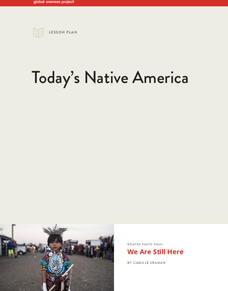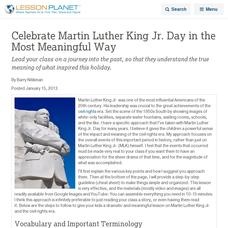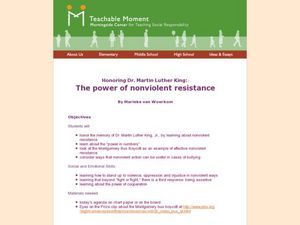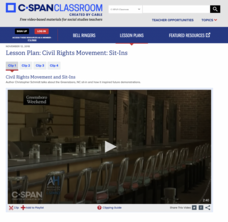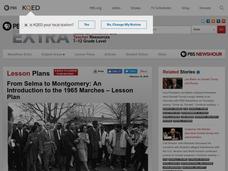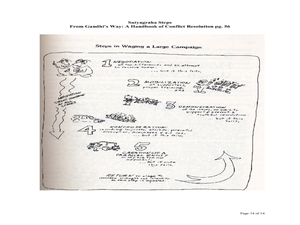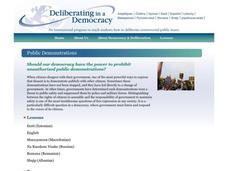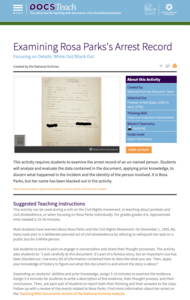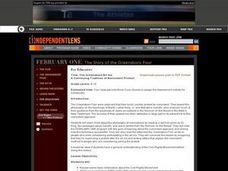Curated OER
Civil Rights Leader: Rosa Parks
All humans should have civil rights, but that wasn't the case in Alabama. This biographical presentation shares information about the life and inspiration that Rosa Parks brought to the Civil Rights movement. It explains her thoughts,...
Curated OER
An Eye for an Eye
High schoolers watch a view introducing them to modern Indian History. During the film, they answer discussion quesitons and discover the concept of non-violent civil disobedience. They share their responses with the class and write an...
Simon & Schuster
Classroom Activities for Walden and Civil Disobedience by Henry David Thoreau
An 11-page packet contains three activities designed for readers of Henry David Thoreau's Walden and Civil Disobedience. In one exercise, groups debate whether Thoreau would today be considered liberal or conservative. For another,...
Global Oneness Project
Today’s Native America
The 2016-2017 protests over the Dakota Access Pipeline (DAPL) motivated Camille Seaman to create "We Are Still Here," a photo essay featuring portraits of contemporary Native Americans who protested the pipeline. This eight-page packet,...
DocsTeach
Martin Luther King, Jr. and the Fight for Civil Rights
Find clues to the past with photos! Young historians use a photo from one of Martin Luther King Jr.'s peaceful protests to practice photo analysis. Academics look at the image to gain clues about what is happening and why. To finish,...
Curated OER
Applying Ahimsa to Traditional Stories
Investigate the life of Mahatma Gandhi by researching non-violent lifestyles. Learners define the word ahimsa and discuss the personal characteristics that made Gandhi a peaceful warrior. They also create a poster about the story "The...
Curated OER
Speaking Out Against War
High schoolers discuss the affect the Iraq War has had on citizens taking advantage of their right to express themselves through non-violent protests and pledges of resistance. They research and discuss local community and school events...
Curated OER
Thoreau, Gandhi, and Martin Luther King, Jr.
Students explore the concept of non-violent resistance. In this political philosophies lesson, students study the political tactics of Mohandas Gandhi, Henry David Thoreau, and Martin Luther King, Jr. in order to discover how each of...
Curated OER
Non-Violence Means "Doing Nothing"
Students reflect on violence and non-violence. In this World History lesson, students read an article by Gandhi then write an essay as to whether they agree or disagree with his thoughts. Students then share all their ideas as a class.
Curated OER
Celebrate Martin Luther King Jr. Day in the Most Meaningful Way
Lead your class on a journey into the Deep South so that they understand the true meaning of what inspired this holiday.
Curated OER
The Power of Nonviolent Resistance
Students discuss the power of nonviolent resistance in terms of Dr. Martin Luther King and the boycotts that he led. In this nonviolent resistance lesson plan, students discuss their thoughts of nonviolent resistance and how they can use...
Curated OER
Speaking Out Against War
Students research on the Web and in other venues to track the Iraq war protests high school students have joined or even led. Students interview students in your community who have joined protests or expressed their views in other ways...
Curated OER
Gandhi's Voice: Writing as Nonviolent Resistance
Ninth graders identify how Mahatma Gandhi used writing as a means of nonviolent communication. For this nonviolent resistance lesson, 9th graders watch a film about Gandhi as a writer and identify characteristics of nonviolent activism....
C-SPAN
Civil Rights Movement: Sit-Ins
Part of the protests of the Civil Rights Movement were small scale sit-ins at lunch counters. This form of on-the-ground activism is the focus of a C-SPAN resource that includes four video-clips about the sit-ins by pupils at a lunch...
PBS
From Selma to Montgomery: An Introduction to the 1965 Marches
The 1965 Civil Rights marches from Selma to Montgomery and the resulting Voting Rights Act of 1965 are the focus of a social studies lesson. The resource uses film clips to inform viewers not only about the discrimination that gave rise...
DocsTeach
The Impact of Bloody Sunday in Selma
Who is to blame when a peaceful protest turns deadly? Scholars research the impact of the civil rights march in Selma, better known as Bloody Sunday. The activity uses files from the FBI's investigation to help academics understand the...
K20 LEARN
Power To The People: Bill Of Rights Art
The works of Juane Quick-to-see Smith are featured in a lesson that asks pupils to consider the role artists play in bringing about social and political change. Scholars examine protest art by Smith and several street artists and...
Curated OER
Gandhi's Non-violent Revolutions: Examining Tools to Make Non-violent
Students analyze Gandhi's philosophy of nonviolent social change. In this nonviolence and social change lesson, students research a leader from the attached list who practiced nonviolent social change. Students write their own poem...
Curated OER
Socratic Seminar on Martin Luther King, Jr.’s Letter From Birmingham Jail
Key in the struggle to gain the rights of democratic citizenship was the April 1963 arrest of Dr. Martin Luther King, Jr. for civil disobedience. To deepen their knowledge and understanding of events during the civil rights movement,...
Curated OER
Paradigm Shift: Gandhian Nonviolence and the Concept of Power
Students interpret historical evidence presented in primary and secondary resources. In this social justice lesson, students examine sources regarding the teachings of Mohandas Gandhi pertaining to nonviolent...
Deliberating in a Democracy
Public Demonstrations
Have you ever fought publicly for an idea you believe in? Scholars research and analyze the right to demonstrate peacefully. Incorporating different real-life scenarios as well as legal decisions exposes the concept of democracy and free...
DocsTeach
Examining Rosa Parks's Arrest Record
There aren't a lot of details on the document, but Rosa Parks's arrest is now a legendary story of the civil rights movement. Class members examine the record—with Parks's names blotted out—to see if they can tell who this document...
Curated OER
Nonviolent Protest Around the World
Twelfth graders complete research that exposes them to examples of nonviolent protest throughout the modern world. In this nonviolent protest research lesson, 12th graders discover information about signification nonviolent movements...
Curated OER
The Greensboro Sit-Ins: A Continuing Tradition of Nonviolent Protest
Pupils watch a video about nonviolent protests during the Civil Rights Movement. They discuss and write about the Greensboro sit-ins while deciding the effectiveness of this type of protest.





